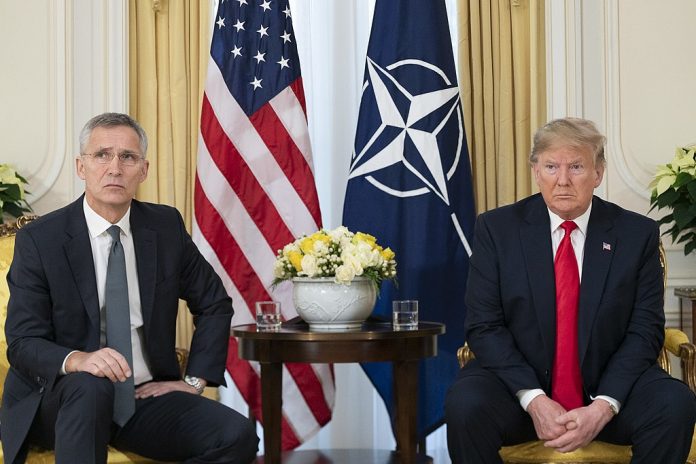After a barrage of criticism by President Trump regarding the functioning of the NATO alliance, the American leader now wants to enlarge the transatlantic alliance to include some countries of the Middle East. On Wednesday, January 8, President Trump informed the NATO secretary that he intends to pursue this endeavour. The decision was made at a time of heightened tensions between the United States and Iran following the assassination of the Iranian general Qassem Soleimani in an American strike in Baghdad January 3. According to President Trump, NATO’s expansion to the Middle East will, in the long term, allow him to consider the withdrawal of U.S. troops from the region. It is conceivable that the American leader will want to expand the alliance to include those countries in the region that share his hostile policy towards Iran, especially Saudi Arabia and the United Arab Emirates (UAE).
Article 5 of NATO could be an obstacle to European support.
In a region of permanent conflict, it is conceivable that European NATO countries will be opposed to President Trump’s expansion plans. Indeed, NATO’s Article 5 forms the core of the Alliance’s collective defence. It states that if a NATO member country is victim of an armed attack, each NATO member country must take all necessary measures, including the use of armed force, to restore and ensure its security.
The European countries of NATO, especially France and Germany, would not be inclined to become involved in ravaged conflicts and lose their balanced foreign policy in the region. The integration of Saudi Arabia to NATO would oblige the European countries of the Alliance to become involved in protecting the sovereignty of the Saudi monarchy in the event of an armed attack. It should be noted that the Saudi monarchy has suffered several attacks on its sovereignty by the Houthi rebels, a Yemeni militia close to the Iranian regime since its intervention in the Yemeni Civil War in 2015. On January 29, Houthi rebels claimed to have launched missiles at Aramco’s oil facilities and drones at Saudi military bases. The involvement of France and Germany in this devastating war in which the primary objective would be to counter Iranian influence in Yemen would risk permanently dismantling Joint Comprehensive Plan of Action (JCPOA), an agreement on Iran’s nuclear programme which France and Germany are seeking to salvage after the U.S. withdrew from the agreement in 2018 and after the British Prime Minister recently declared his support for the idea of a new agreement.
Yet relations between Iran and the European members of the JCPOA have been further weakened since Tehran announced on January 5 the fifth and final phase of its intentions to disengage from their nuclear commitments in response to the heavy sanctions imposed by the Trump administration. This decision prompted the European co-signatories of the JCPOA to initiate the dispute settlement mechanism in order to force Iran to return to their commitments. In view of the recent tensions between Iran and the European countries of the JCPOA, as well as the recent rise in tensions between Iran and the United States, France and Germany will not want to further undermine European diplomacy on the Iranian nuclear issue and will therefore not support an enlargement of NATO towards the major powers of the Arabian Peninsula.
Europeans divided on the necessity of NATO
Faced with American unilateralism, France wishes to give impetus to the European defence project. In this year’s Munich Security Conference, President Macron announced his intention to see France provide the nuclear deterrence role in an integrated European defence policy. In addition, President Macron expressed his willingness to build an architecture of security and trust between the European Union and Russia.
Yet European countries have not shown any real enthusiasm for President Macron’s proposals. Germany suspects Paris of wanting to promote European defence in order to serve its own interests. It has no intention of jeopardising its defence and security relations with the U.S. and will not support President Macron’s policy of rapprochement with the Kremlin. President Macron’s Russian policy is also a matter of great concern to the Baltic countries and the countries of the former Warsaw Pact. These countries still regard President Putin as a former KGB officer and the Russian Federation as the successor state to the Soviet Union, which annexed them. For these countries, NATO remains a useful and necessary security alliance to counter Russia’s expansionist intentions.
President Macron cannot afford to fracture his relations with his European NATO allies. With a pacifist Germany, the only concrete solution for Paris would be to build its future bilateral defence and security relations with Britain. Indeed, the consequences of Brexit have meant that France has lost its strategic and military twin, the country with which it shares a permanent seat on the United Nations Security Council and with which it shares comparable military and nuclear capabilities. It is therefore in Paris’s interest to establish a new bilateral defence and security agreement with London that responds to current strategic issues at stake in Africa, the Middle East and Asia.
The views and opinions expressed in this article are those of the author.

The author has recently graduated with a Masters in International Relations from the University of New South Wales, Sydney, Australia. His research interests are focussed on geopolitical and security issues specific to the Middle East and their impact on European powers.


